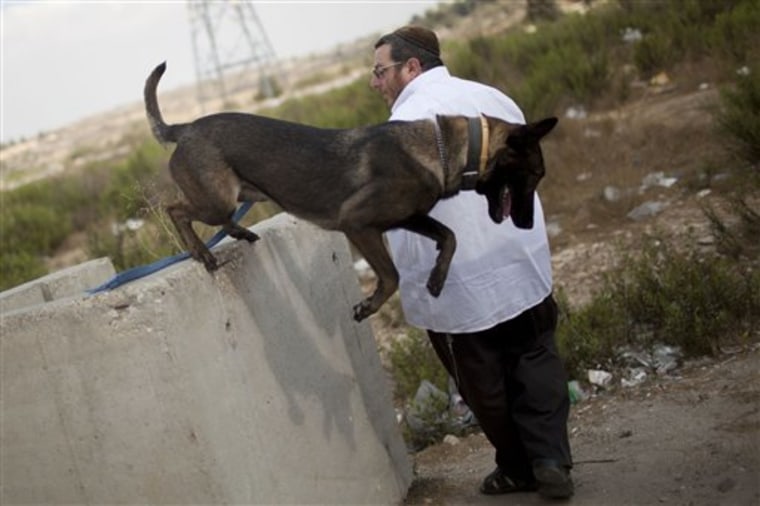Israeli forces are seeking to prevent bloodshed when Palestinians march in support of a statehood drive this month, but they are preparing for worst-case scenarios, even authorizing West Bank settlers to shoot at Palestinians who approach their communities.
Palestinians say the rallies will be peaceful — a view shared by Israel's own security assessments — and will steer clear of any settlements. Yet, the combustible atmosphere and the long and deadly history of Israeli-Palestinian violence are raising the specter that events might spin out of control.
For the Palestinians, the mass marches are intended to boost their campaign to get the U.N. to recognize an independent state, a strategy they are trying because negotiations aimed at bringing about a state through a peace deal with Israel have been stalled for two years.
Settlers living on land the Palestinians want for their future state have long been targets for militant attacks; likewise, some settlers have attacked Palestinian civilians. The fear among settlers now is that even unarmed crowds — if large enough — could overrun their communities.
Ilan Paz, a retired Israeli general who served in the West Bank for a decade, said a scenario with hundreds of casualties was not unthinkable.
"You can't know how this sort of protest will end," Paz said. "All sorts of local incidents can lead to injuries, and this can cause a deterioration in the situation."
Israel's army is training soldiers used to battling gunmen in non-lethal riot control tactics and inviting settlers to watch the drills at a military camp in a rural part of central Israel.
The mass demonstrations are set for around the time of the Sept. 13-22 United Nations General Assembly session, where the Palestinians hope to be granted official endorsement as a state. Some doubt the rallies will take place at all, however, and several Palestinian activist groups say they will not take part, believing the effort would achieve little.
Preparations undertaken by police are expected to cost Israel about $20 million, according to a senior police officer. Purchases include 16 long-range tear gas launchers, 15 trained Belgian horses to bolster the police's mounted forces, and a weeklong riot training course for a quarter of the nation's 28,000 police officers, he said.
Police expect Israeli-controlled east Jerusalem, home to 250,000 Palestinians, to be a flash point, he added. He spoke on condition of anonymity because of the sensitive nature of the precautions.
Security forces are stockpiling tear gas, stun grenades, water cannons and other non-lethal weapons. At a military camp about an hour's drive from Israel's metropolitan center in Tel Aviv, troops are practicing civilian crowd control.
But in the West Bank, some settlers say they do not fully trust the army to handle any unrest.
The army "doesn't always know how to deal with this sort of event," said Avraham Binyamin, a spokesman for Yitzhar, a settlement considered extreme even by many settlers.
Palestinians marching toward settlements are a threat even if they are not carrying firearms, he said: "You can kill with a rock or a knife, and you can burn with a match."
There are 300,000 Israeli settlers in the West Bank, living among around 2.5 million Palestinians. Settlements are typically guarded by soldiers and by teams of local residents armed by the military. In addition, many settlers carry private firearms, and clashes between settlers and Palestinians are common.
The Palestinian Authority, the Western-backed government that has partial authority in the West Bank, has released a schedule of planned September protests slated to be held in city centers and villages. The list includes no planned marches toward settlements.
Saeb Erekat, the chief Palestinian negotiator, said fears of Palestinian violence were "absolutely unfounded."
"The real fear of the settlers and (Prime Minister Benjamin) Netanyahu is that they know that once Palestine is admitted as a member of the U.N., their days of occupation and settlements are numbered," he said.
In coordination with the military, each Israeli settlement has identified a "response line" around its perimeter, said Shlomo Vaknin, security officer for a settler umbrella group known as the Yesha Council. Should Palestinians cross that line, the military will shoot at marchers' feet or in the air. If soldiers are not on hand, responsibility to react will fall on the settlements' civilian guards, Vaknin said.
In response, the Association for Civil Rights in Israel sent a complaint last week to the military's advocate general claiming the settler training amounts to inciting vigilante violence against unarmed civilians exercising their right to protest. The army did not immediately comment on the complaint.
Mike Guzafsky, 47, a settler who trains guard and attack dogs for settlements, noted that the army appeared to have been caught by surprise last month when militants crossed the Egypt-Israel border and ambushed vehicles in southern Israel, killing eight people. He said he got 100 requests for dogs ahead of September, far above the usual.
"What happens," he said, speaking at the West Bank settlement of Elazar, if the army "is once again caught off guard when 500 hostile Arabs are trying to penetrate a settlement with knives and guns?"
Michael Ben-Ari, an Israeli lawmaker associated with the extremist fringe of the settlement movement, issued a pamphlet to settler leaders encouraging settlers to match every unarmed Palestinian march with an Israeli one.
"No more soldiers and border police against groups of Arab children and women. Instead, children versus children, youth versus youth, and women versus women — this is how we will destroy the September effect," he wrote.
Other settlers denied they were readying for a fight.
"The atmosphere is business as usual," said Danny Dayan, chairman of the Yesha Council. "We believe the army and police will take the necessary measures."
